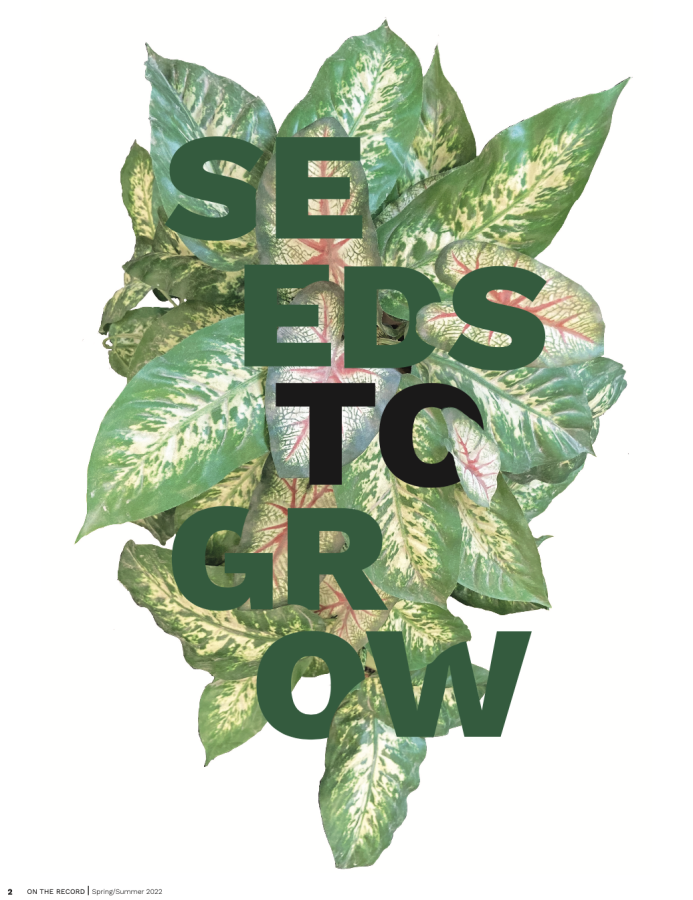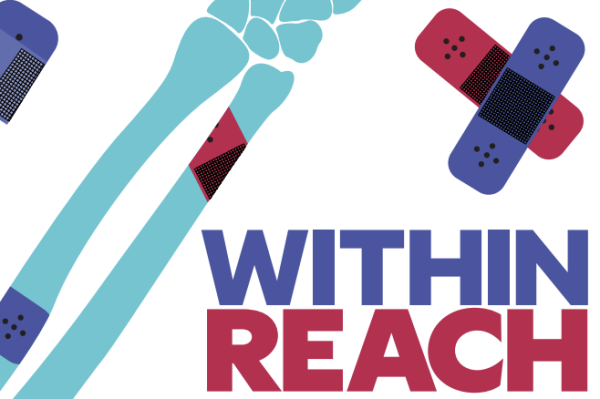Seeds to Grow
Here’s one organization’s mission to empower a new generation of urban farmers.
From the street, it didn’t look like much: a few raised gardening beds, lots of tall grasses and flowers, one of those small library boxes, and – perhaps the most noticeable – the two greenhouses. Across the street, houses sat side by side. There was an old mattress perched at the bottom of a driveway and trash cans waiting to be emptied. To someone passing by, the land was merely a small break in the rows and rows of houses in Louisville’s Shawnee neighborhood. However, when truly examined, the life living amongst this small plot of land was far greater than what was visible at first glance.
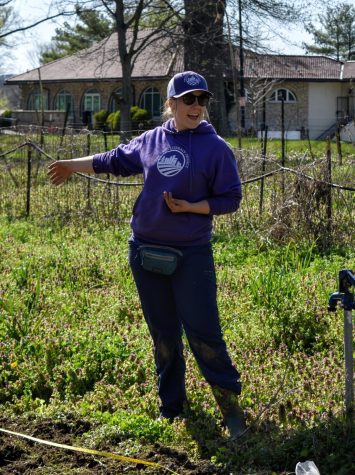
Behind a line of trees, the garden opened up. There were rows of raised soil stretched out parallel to the road. At the far end, a group of young people stood; some of their arms were woven across their chests, others had their hands in their pockets. Many of their eyes wandered from side to side, but they all focused on one woman in particular: Grace Mican. She stood facing the group, a casual lean in her hip demonstrating how comfortable she felt in the role. A small bag filled with beet seeds rested in the palms of her hands.
Mican called out instructions to the group.
“If you are on the center line, plant every three and nine inches. On the outer two rows, plant at six and 12.”
The group absorbed the information as it came. To them, understanding it was as simple as reciting the ABCs. To anyone else, it was a foreign language.
“The theory is abstract until we actually get our hands dirty,” Mican said.
After a few more minutes, the crew dispersed down the row, planting themselves at their assigned spots along the tape measure.
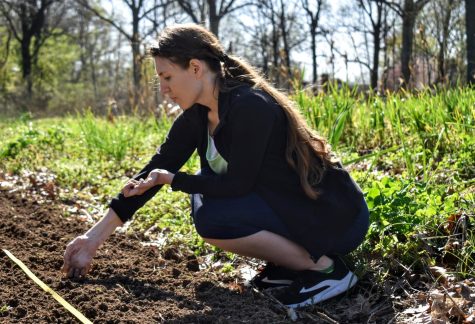
They worked quietly and with an attentive focus on detail. Their movements became seemingly robotic: place a seed, measure using their hand, place another seed. Repeat, repeat, repeat. The process of planting seeds across the whole row took nearly ten minutes in total. However, the process didn’t just begin nor was it going to be over anytime soon. This was just one step along the way.
For college student Nick Bremer, 22, this wasn’t his first time planting seeds with the group. He knew better than most that this step of the process was merely the beginning, and that waiting for the food to grow was debatably the hardest part.
Bremer came to the city four years ago to attend the University of Louisville, where he majored in sustainability. While in school, he wanted to get a job focused on his areas of interest, so he looked to Handshake, a website dedicated to connecting college students with employment opportunities. That is where he stumbled upon the Food Literacy Project (FLP).
“The job seemed like the perfect combination of being outside and hands-on work, while also getting to know the community,” Bremer said.
The FLP is a non-profit organization in Louisville dedicated to connecting the community with agriculture. They look to the next generation of young people in Louisville to teach them about the importance of food systems and being aware of where their food comes from. They have multiple programs with different underlying values and varying opportunities. Bremer is part of the Youth Community Agriculture Program (YCAP), an employment opportunity for those aged 16 to 21.
During the summer months, members of the program work 30 hours a week in the garden. They do everything from planting and harvesting to learning from speakers brought in from around the community. The fall and spring seasons are similar, except they work fewer hours, averaging 12 a week. The program, however, hasn’t always been this extensive.
It started off slow with groups of school kids coming out monthly to Oxmoor Country Club, which is where the FLP originated.
“Teachers were like, ‘Kids don’t know where their food comes from,’” said Alix Davidson, director of strategic initiatives at the FLP. “We need to get them out to a farm so they can see it’.”
While these one-time field trips were a good beginning for the organization, they realized that it was only giving students a snapshot of what farm life truly entailed.
“There’s an opportunity to work towards more systemic changes and engage them on a deeper level when we are doing longer term programming with the same youth,” Davidson said.
So in 2011, YCAP began as a way to do that, and it has been developing ever since.
Mican is the program manager. She oversees everything YCAP does, from the farm’s crop rotation and planning to searching for experts that are willing to come talk with the crew. In addition, she is the one who runs the YCAP work days.
Mican first volunteered for the FLP back in 2014, but didn’t officially start working there until after she graduated college with a degree in environmental science from Bellarmine University in 2017.
“I was really drawn to food systems in general because I was in this environmental program,” Mican said. “I often feel so dwarfed by the size of the issues that we face when we’re talking about our environmental situation these days.”
Mican came to YCAP with the goal of bringing power back to youth, a group she said often gets discounted for not having much to offer due to their age and lack of experience.
“I think that there is a lot of energy and potential and curiosity in the youth, right?” Mican said. “And often not lots of opportunities to explore those things through dignified work.”
Growing up in northern Illinois, Bremer was in a bit of shock when he initially joined YCAP.
“I grew up in suburbia,” Bremer said. “So, being on a farm, in an urban setting, that was not even something that seemed possible to me.”
On his first day last summer, they met at the People’s Garden, tucked back into Louisville’s Shawnee neighborhood. This was YCAP’s first season at this garden, and it had given them more freedom to do what they want with the land.
When he arrived, they did the usual: getting to know the crew and going on farm tours. However, the experience was far different than what most of the crew had done for work before.
“It was just a weird environment,” Bremer said.
It wasn’t like the fast food jobs he had worked in the past. This job was outdoors, didn’t have set uniforms, and Bremer actually cared about his voice being heard.
“You’re not going to know everything off the bat,” Bremer said. “There’s no fault in not knowing. You know, there’s no losing or being wrong – it’s just learning as you go.”
As the weeks passed, Bremer settled into the new environment.
“I don’t feel alone,” Bremer said. “I actually like coming to work and am sad when it rains.”
YCAP is built around giving students the resources they need to grow into independent and capable individuals.
“We create a lot of opportunities for their voices to be heard,” Davidson said, “which is sometimes intimidating, and we really try not to push them too much, but to create opportunities where they really can step out of their comfort zone.”
While Davidson and Mican currently have more knowledge and experience than the farm crew, they know that one day these youth will be the ones making the decisions.
“Youth need to be the drivers of change because this will be their world and their problems,” Mican said.
The YCAP crew knows this and are already aware of the positive effects they are creating.
“Being able to understand what you’re eating and where it comes from is a privilege that not everyone has,” Bremer said.
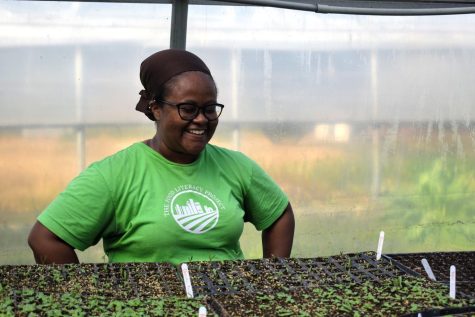
Their impact extends beyond the borders of the People’s Garden and into the surrounding neighborhoods.
“We’re doing very community based work, and something that we try to avoid as an organization is coming in from the outside and saying, ‘We know how to solve the problems,’” Mican said. “Because the people who live in the communities are the experts on what is happening there and how we can shift what is happening there to better serve them. We’re starting to have those conversations about the real versus the ideal and how do we push toward what would be more ideal.”
Out at the People’s Garden, the YCAP crew gathered around a seemingly normal pickup truck. Its coat of red paint was slightly scratched up, and the sides were marked with the FLP’s logo.
Mican, again, stood facing the group, this time leaning up against the bed of the truck. The bed was filled with soil and old wilted plants that hadn’t seen the sun or water in months.
She explained what it was: the Truck Farm, a garden on wheels.
The crew began pulling out all the dead plants that had settled there throughout the cold winter months. Once satisfied with their work, they brought out new seedlings. As they planted, they had lighthearted conversations and made jokes.
“It’s a pickup truck that has a whole bunch of dirt in the bed of the truck, and every season we try and plant veggies, herbs, whatever we can fit in there,” Bremer said. But it is more a way to show that there’s not just one way to farm.”
The FLP drives it around to different events, such as farmers’ markets and camps around Louisville. The community is able to see how gardening isn’t stagnant and can be beneficial even outside of its standard form.
“Some people may think it’s silly, but it is a portable farm that can provide for you or anyone,” Bremer said.
While access to land in Louisville’s West End is limited, the Truck Farm showcases how space isn’t as vital to growing fresh foods as previously thought. People can still grow and provide for themselves in small areas such as windowsill gardens, or even out of a truck bed.
Beyond just growing food, YCAP looks to educate the crew on healthy food habits and how to cook with them.
“You can learn how to grow food and you can have access to fresh vegetables sometimes,” Mican said. “But if you don’t know what to do with them, then they are just sitting in your fridge, looking at you.”
They take foods that kids are already exposed to, such as pizza, and add a fresh twist to them. They will add kale and make the sauce from scratch using other vegetables grown on the farm.
As a high school student, Maggie Epperson, 22, first started working as part of YCAP back in 2017. She recalls feeling uneasy in a new environment, similar to Bremer.
“I remember my thought was, ‘Okay, literally I am going to die on this farm and get murdered, or I am going to love it’ — I ended up loving it,” Epperson said.
Epperson was diagnosed with Type 1 diabetes when she was two years old. She grew up hyper fixated on the foods she was eating, more so than other kids around her.
“That kind of made me look at food a different way just cause you have to count the carbs,” Epperson said. “You have to look at it a different way than most people would.”
She came to the FLP with the hope of expanding her knowledge on foods and where they come from, as food has a unique role in her own life.
While Epperson was in YCAP over the summer, her days were split in half, with the mornings including work on the farm and the afternoons occupied by other educational activities, which she enjoyed more.
One day, the crew took a field trip to another farm in the West End. Epperson introduced herself to a farmer who was growing vegetables. She asked how he was going to prepare the food, and the farmer responded that he didn’t eat very many vegetables. Epperson found it weird that a farmer who grew fresh food wouldn’t like or know how to cook the foods he was growing.
It wasn’t until later that she realized many people in Louisville haven’t grown up in a food diverse household, where fresh vegetables are available.
“You hear the term food desert, but how does that actually apply to the people living in them?” Epperson said. ”How is their relationship with food different?”
Through YCAP, Epperson saw how peoples’ relationships with food differ. After two summer seasons with the program, she went off to college, where she became a classically trained chef at Johnson and Wales University. YCAP made Epperson more curious about food’s effects on those around her, and after she graduated from college, she came back to the FLP, this time as an intern helping to guide students through their experience on the farm.
Now Epperson is hoping to share her knowledge and experience through her own business called the Diabetic Nutrition Coach. She hopes to show others that diabetes shouldn’t be a boundary on what they can and can’t eat, and that people can form their own unique relationships with food.
Looking back on her time at YCAP, Epperson is grateful for the program, as it’s had a lasting impact on her. She has used what she has learned to grow into the next phase of her life.
Bremer now stands looking toward his own future. He is finishing out his final season of YCAP, and as of May 14, he has graduated from college.
He says the most valuable lesson he has learned is “patience, lots and lots of patience.” It takes patience to not see the immediate results of his hard work. It took the beets over a week to be visible from the top of the soil, and it will be many more until they are ready to be harvested.
“There’s a moment when sprouts first pop up out of the soil that you know that life is created and that you played some part in that,” Davidson said.
Donations are collected through The Publishers, duPont Manual High School's booster club for J&C. On The Record relies completely on sponsorships, advertisements, and donations to produce and distribute each issue. Please consider donating to our cause, and helping the student journalists of OTR amplify youth voices for years to come.
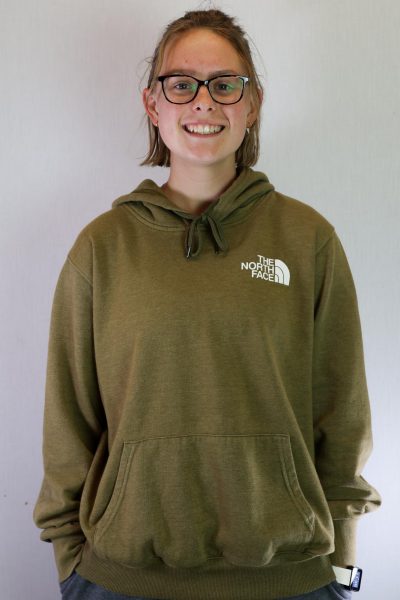
Lily Cashman is a senior and the Editor-in-Chief of On The Record. In her third year on staff she is excited to continue providing...


